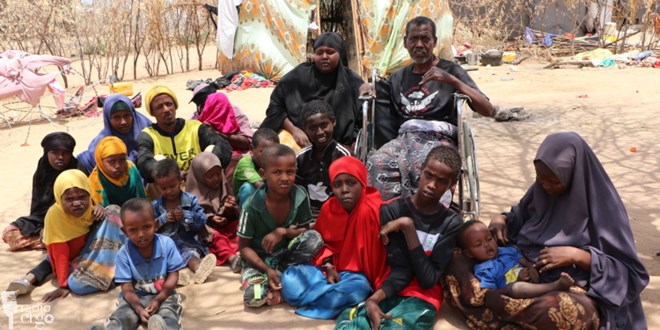
Friday September 15, 2023

Anab and her family of 24 people including disabled children and elderly father by their makeshift shelter in Ifo2 camp in Dadaab/Bashir Gahnug
Anab Hassan Mukhtar arrived in Kenya’s Dadaab camp complex on 28 July with her family of 24 people hoping to find aid for her struggling family from Somalia but has not been able to register for refugee status.
They are short of food and sleeping under trees in Ifo2 camp.
They have set up a small shelter made of sticks and pieces of cloth where Anab’s four young children and her father sleep, whilst the rest camp outside on the sand.
“We don’t have anything to eat or drink, our living conditions are very bad. God sees everything. Besides the donations we get we don’t have anyone working or any savings,” she said.
Anab’s husband separated from her three years ago and she has been raising her children alone. Two of them are disabled and one has a mental illness. Her father used to support them before he developed high blood pressure and suffered a stroke resulting in partial paralysis so that he can neither walk nor speak.
“If the blood pressure rises and we take him to hospital, a registration card is required. We don’t have a toilet, a house, bedding, or water. We hope we will get some aid,” she said.
Anab and her family migrated from Kham-kham village in Lower Juba. They travelled for two days to reach the camp using the $455 locals in the village raised for their transport.
They moved to the refugee camp hoping to get a better life following extreme hardships in their village due to prolonged drought.
“I thought we would get registered as soon as we arrived in the camp, I thought we would be welcomed and get a house and other services. But it didn’t turn out as I hoped,” she said.
Ubah Ali Bayow is also among the new arrivals to Ifo2 struggling to get one meal for her family. This mother of seven lives with her elderly mother and disabled sister who need regular food.
They arrived in Ifo2 on 25 July and have no shelter or food.
“We arrived here to find people were not getting [food aid] cards. We don’t have a house or a toilet. We sleep in the open and are beaten by the strong winds blowing. Sometimes we get water but other times we don’t,” she said.
Ubah and her family migrated from Hagar village, Lower Juba, after losing 37 of their 45 camels. Her husband remained in the village with the last eight camels. They received $260 from her husband’s relatives to travel to Dadaab.
After they left the village, Ubah’s husband broke his leg while herding his camels and is recovering in Afmadow.
“I am sitting here with my children but despite coming here for help we haven’t got anything from the aid organisations. We don’t have anything. We fled the village we know to face the same problems in an unfamiliar place,” she said.
Warsan Abdirahman, one of the camp leaders, said people with disabilities were suffering the most. Unlike other refugees they cannot go out to find jobs and have to rely on help from relatives or neighbours who have nothing.
Warsan noted that 1,400 families who recently arrived in Ifo2 camp are still awaiting registration as refugees.